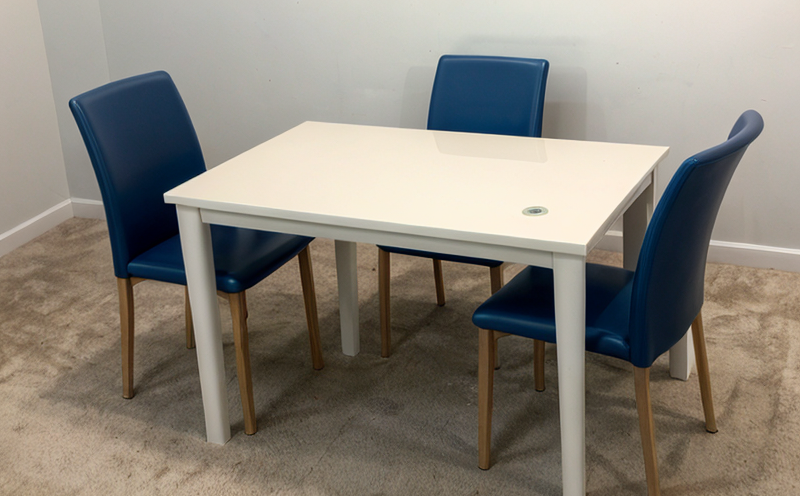BS 2782 Impact Strength Testing of Interior Plastic Products
The British Standard BS 2782 is a crucial document that outlines the method for determining the impact strength of interior plastic products, including furniture components. This test is particularly important in ensuring that plastics used in such applications are durable and safe under real-world conditions.
Impact strength testing evaluates how well an object can withstand impacts without fracturing or breaking. For interior plastic products, this resilience is critical since they often experience various forms of impact during use. The BS 2782 test provides a standardized method to measure the toughness of these materials, which helps manufacturers and quality managers ensure product safety and reliability.
The standard specifies precise procedures for preparing specimens, conducting tests, and interpreting results. Specimens are typically prepared from the plastic material in question, cut into uniform shapes that can be tested under controlled conditions. The test involves applying a defined impact force to these specimens using an instrumented pendulum or similar apparatus.
Understanding the outcome of this test is essential for quality assurance teams and R&D engineers as it informs decisions about material selection, design improvements, and compliance with industry standards. By adhering to BS 2782, manufacturers can enhance their product's marketability by demonstrating a commitment to safety and performance.
The results from BS 2782 testing are reported in terms of the energy absorbed by the specimen during impact, often measured in joules (J). This value provides insight into the material’s toughness and its ability to absorb shock without failing. Reporting these values allows for consistent quality control and comparison across different batches or suppliers.
In summary, BS 2782 testing is a vital tool in the development and production of safe interior plastic products. It ensures that materials used in furniture and other applications can withstand the stresses they are likely to encounter during use. This standard plays a key role in safeguarding consumer safety and maintaining high-quality standards.
- Ensures consistent quality control
- Supports material selection processes
- Facilitates compliance with industry standards
- Enhances product durability and reliability
- Provides data for design improvements
- Aids in ensuring consumer safety
Why It Matters
The importance of BS 2782 impact strength testing cannot be overstated, especially when considering the durability and safety requirements of interior plastic products. These materials are often exposed to a variety of stresses and impacts in everyday use, making their resilience critical.
Manufacturers must ensure that the plastics they use can withstand these conditions without compromising on quality or safety. BS 2782 testing provides a reliable method for assessing this toughness, offering valuable insights into how materials perform under impact stress. This information is crucial for maintaining high standards of product integrity and reliability.
For compliance officers and R&D engineers, the results from these tests are essential for informed decision-making. They can use the data to refine designs, select appropriate materials, and ensure that products meet all necessary safety requirements. The standard’s consistency ensures that every batch produced meets stringent quality benchmarks.
In addition to enhancing product performance, BS 2782 testing also plays a vital role in protecting consumers. By ensuring that interior plastic products are robust enough to handle the stresses they encounter, manufacturers can prevent potential hazards and improve overall safety standards.
Eurolab Advantages
At Eurolab, we provide comprehensive testing services tailored to meet the highest industry standards. Our expertise in BS 2782 impact strength testing ensures that our clients receive accurate, reliable results every time. Here are some of the key advantages you can expect from working with us:
- Compliance Assurance: We stay abreast of all relevant standards and regulations, ensuring that your tests meet or exceed industry requirements.
- Accurate Results: Our state-of-the-art facilities and experienced technicians guarantee precise testing outcomes.
- Dedicated Support: Our team is available to answer questions and provide guidance throughout the testing process.
- Rapid Turnaround: We understand the importance of timely results, so we strive to deliver reports quickly without compromising on accuracy.
- Expertise in Polymer & Plastics: With years of experience in this field, our specialists have a deep understanding of material properties and testing methods.
- Confidentiality: We respect the confidentiality of your projects and data, ensuring that all information remains secure.
We are committed to providing exceptional service that helps you achieve your quality and compliance goals. Contact us today to discuss how we can assist with your BS 2782 testing needs.
Why Choose This Test
- Ensures Material Toughness: The test provides critical data on the toughness of interior plastic materials, ensuring they are robust enough for everyday use.
- Avoids Safety Risks: By confirming that products can withstand impacts without breaking, this test helps prevent accidents and injuries.
- Promotes Quality Control: Regular testing ensures consistent product quality across all batches, enhancing overall reliability.
- Supports Design Improvements: Insights gained from the test allow for continuous improvement in material selection and product design.
- Facilitates Compliance: The standardized nature of BS 2782 ensures that products meet all necessary regulatory requirements.
- Aids in Decision-Making: Accurate testing data provides valuable information to help quality managers, compliance officers, and R&D engineers make informed decisions.
Selecting this test is a strategic choice for ensuring the safety, durability, and reliability of interior plastic products. It offers a reliable method for evaluating material performance under impact stress, ultimately contributing to higher standards in product development and manufacturing.





